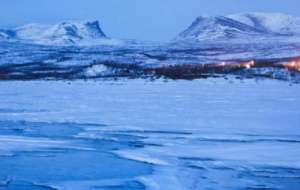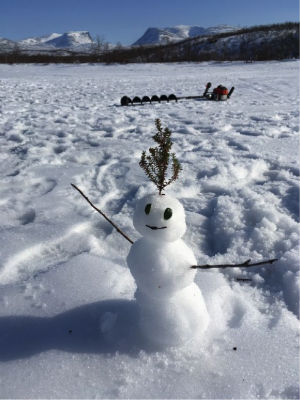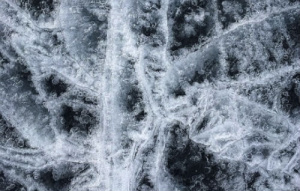Polar Prediction School

Lapporten at night
Research Training Fund Report – Sam Cornish
Abisko, northern Sweden, 17-27 April
In March 2018, I received a £500 grant towards travel costs associated with attending the Polar Prediction School in Abisko, northern Sweden. In this report I briefly summarise the scope of the school and what I took from it that is valuable for my DPhil Research.

Snowman, Ice Drill and Lapporten beyond
The Arctic is warming twice as fast as the global mean. It plays an important role in atmospheric and oceanic dynamics, and the changes it is experiencing feed back on these dynamics, as well as affecting the Arctic environment itself. In short, changes to the Arctic – whether in terms of sea-ice cover, temperature, salinity of the ocean – can have much broader impacts, though all of these are uncertain. Climate and ocean scientists want to understand the role that a changing Arctic will play in the climate and ocean dynamics of the future. Will a reduced sea-ice cover impact midlatitude weather? Will increased (sporadic) freshwater fluxes affect the Atlantic south-to-north heat transport? What actually controls these Arctic variables? Can we predict these changes?
It was these types of questions that the school aimed to equip us to solve. Topics included: polar weather; chaos and predictability; measuring the Arctic atmosphere; Swedish weather; polar lows, Arctic hurricanes?; sea-ice predictions; data assimilation in weather models; remote sensing of the cryosphere; stable boundary layers; diurnal cycles; clouds – liquid, solid or mixed-phase; polar-midlatitude linkages; sea-ice characteristics; turbulent exchange. Lecturers from leading institutions gave talks and led practical sessions. We also made our own observations and contributions to weather forecasting, by releasing radiosonde balloons – which establish the humidity and temperature structure of the atmosphere as they rise – and with a stationary ‘met mast’, which measured winds and temperatures from the surface up to 15m high in order to decipher surface energy balances.

Ice Textures, Torneträsk
The school was a real complement to my skill set – I have a good basis in oceanography but also need to understand the atmospheric and sea-ice components of the real Arctic, and their representation in climate simulations. The school helped me get to grips with these areas, and I feel better prepared as a result.
I just published a paper with my supervisor and co-authors in Geophysical Research Letters: Arctic Ocean freshwater content and its decadal memory of sea-level pressure. Geophysical Research Letters, 45. – doi.org. What I learned about sea-ice interactions and predictability at the Polar Prediction School will help me to expand on this work.
I am extremely grateful for the travel support that Univ provided me with.
Find out more about the range of travel grants and scholarships available to assist Univ students on our Travel Grants page or read further travel reports.
Published: 29 June 2018
Explore Univ on social media
